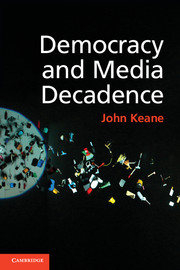4 - Democracy’s opponents
Published online by Cambridge University Press: 05 June 2014
Summary
The closed-system consociations among politicians, journalists, public relations specialists and lobbyists, the hidden power zones that this book has called mediacracy, sometimes assume scandalous proportions. The development of a bizarre ‘toxic shadow state’ anchored in webs of exchanges among News International executives and journalists, police, snooping private detectives, celebrities, innocent citizens and politicians within the Westminster parliament is an example of what can happen in practice when the trend is left unchecked by toothy public scrutiny mechanisms. Other examples include the tendency of governing parties in the new democracies of central-eastern Europe to colonise state institutions with the help of ‘friends’ in the fields of journalism, business, lobbying and public relations; and the deep involvement of prominent journalists and political lobbyists in scandal-ridden efforts to broker deals between politicians and business leaders during the allocation of valuable parts of the second-generation (2G) mobile phone spectrum in India. These episodes in the drift towards mediacracy bode ill for monitory democracy; for many observers, they reinforce its decadent ‘feel’. Their sense of decay amid profusion is amplified by other trends. Communicative abundance (as we have seen) is deeply implicated in such phenomena as flat earth news and no earth news. It is bound up with cyberattacks; moves to restrict freedom of information through digital gatekeeping; and the proliferation of manipulative consumer marketing algorithms. Communicative abundance is linked to mushrooming media oligopolies and to claims (arguably exaggerated) that the growth of media-saturated societies damages everyday life, for instance, by amplifying the loneliness of citizens.
Looking back, looking forward
The various trends are, for the moment, not convergent, but their seriousness reminds us that monitory democracy has no historical guarantees – and that, in principle, this new historical form of handling power can suffer loss of traction and atrophy, perhaps even be snuffed out, as easily as a candle by puffs of wind.
- Type
- Chapter
- Information
- Democracy and Media Decadence , pp. 191 - 212Publisher: Cambridge University PressPrint publication year: 2013

